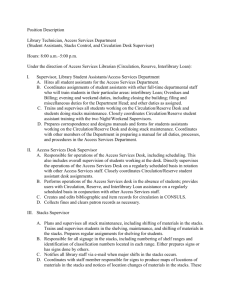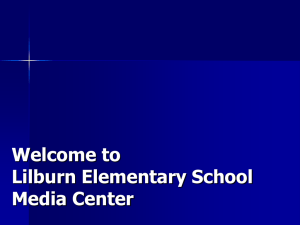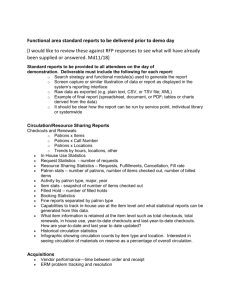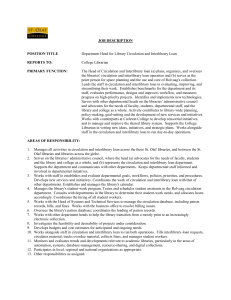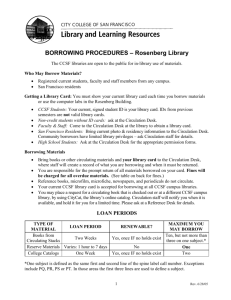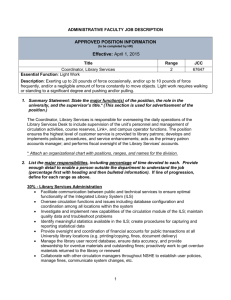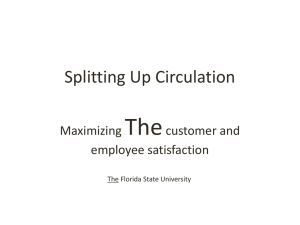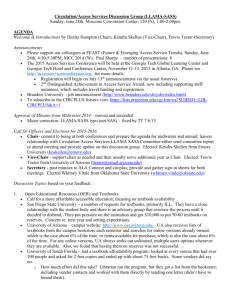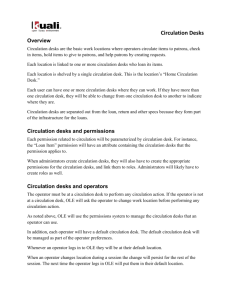R_2008-09_Access_Services_Annual_Report
advertisement
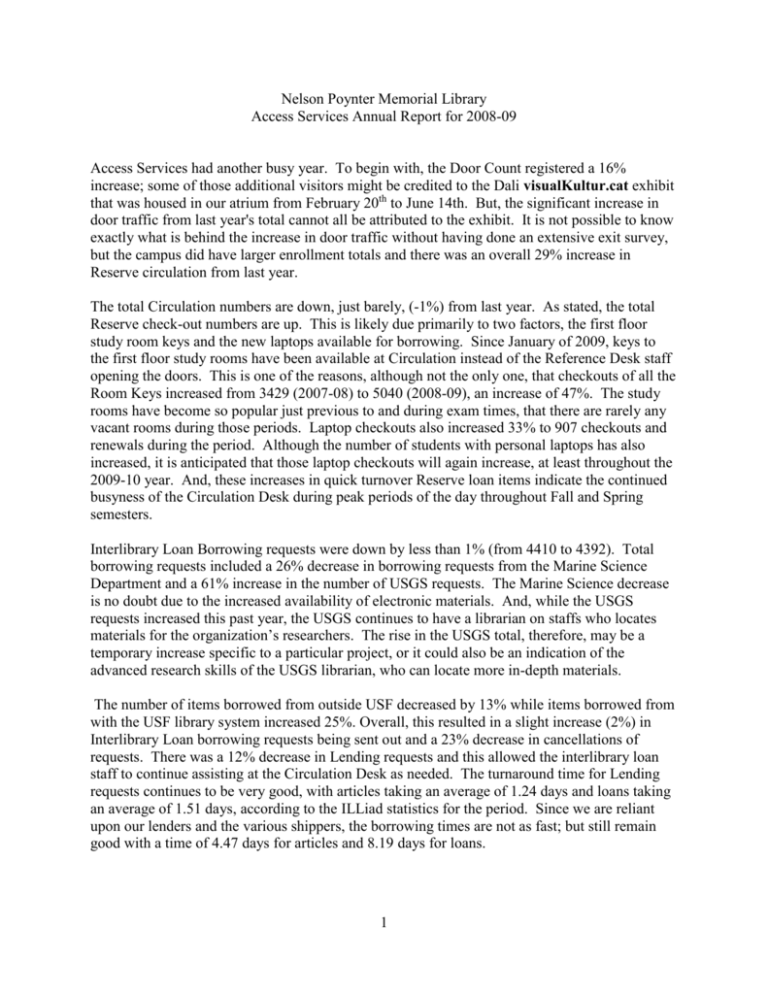
Nelson Poynter Memorial Library Access Services Annual Report for 2008-09 Access Services had another busy year. To begin with, the Door Count registered a 16% increase; some of those additional visitors might be credited to the Dali visualKultur.cat exhibit that was housed in our atrium from February 20th to June 14th. But, the significant increase in door traffic from last year's total cannot all be attributed to the exhibit. It is not possible to know exactly what is behind the increase in door traffic without having done an extensive exit survey, but the campus did have larger enrollment totals and there was an overall 29% increase in Reserve circulation from last year. The total Circulation numbers are down, just barely, (-1%) from last year. As stated, the total Reserve check-out numbers are up. This is likely due primarily to two factors, the first floor study room keys and the new laptops available for borrowing. Since January of 2009, keys to the first floor study rooms have been available at Circulation instead of the Reference Desk staff opening the doors. This is one of the reasons, although not the only one, that checkouts of all the Room Keys increased from 3429 (2007-08) to 5040 (2008-09), an increase of 47%. The study rooms have become so popular just previous to and during exam times, that there are rarely any vacant rooms during those periods. Laptop checkouts also increased 33% to 907 checkouts and renewals during the period. Although the number of students with personal laptops has also increased, it is anticipated that those laptop checkouts will again increase, at least throughout the 2009-10 year. And, these increases in quick turnover Reserve loan items indicate the continued busyness of the Circulation Desk during peak periods of the day throughout Fall and Spring semesters. Interlibrary Loan Borrowing requests were down by less than 1% (from 4410 to 4392). Total borrowing requests included a 26% decrease in borrowing requests from the Marine Science Department and a 61% increase in the number of USGS requests. The Marine Science decrease is no doubt due to the increased availability of electronic materials. And, while the USGS requests increased this past year, the USGS continues to have a librarian on staffs who locates materials for the organization’s researchers. The rise in the USGS total, therefore, may be a temporary increase specific to a particular project, or it could also be an indication of the advanced research skills of the USGS librarian, who can locate more in-depth materials. The number of items borrowed from outside USF decreased by 13% while items borrowed from with the USF library system increased 25%. Overall, this resulted in a slight increase (2%) in Interlibrary Loan borrowing requests being sent out and a 23% decrease in cancellations of requests. There was a 12% decrease in Lending requests and this allowed the interlibrary loan staff to continue assisting at the Circulation Desk as needed. The turnaround time for Lending requests continues to be very good, with articles taking an average of 1.24 days and loans taking an average of 1.51 days, according to the ILLiad statistics for the period. Since we are reliant upon our lenders and the various shippers, the borrowing times are not as fast; but still remain good with a time of 4.47 days for articles and 8.19 days for loans. 1 To accommodate the Student Government request and student need, the building was open and staffed until midnight by one FTE staff and a security guard during both Fall 2008 and Spring 2009 final exam weeks. The informal hourly count of the students taking advantage of the increased hours only once reached one hundred during Dec. 2008 late hours and one time reached 90 during April 2009 exams, yet the students who did use the facility appeared grateful that the library was open to accommodate them. The Access Services staff continues to open the library at 8 a.m. and now monitors the Service Desks until Reference opens at 10 a.m. The Reference staff is always available for consultation and backup during those first two hours of operation. The Head of Public Services and the Head of Access Services are considering expanding the hours that Access Services covers the desks, or developing some other model of staffing to suit our library's needs. Lexi Terry, with student assistant help, has completed the shift of materials on 26 ranges of the second floor stacks and relabeled the ranges as materials were moved. When the AV materials were moved to the first floor of the library building during Winter break of 2008, additional ranges on the second floor were opened up for the circulating collection. The shift was reorganized and the vacated shelves were quickly filled by Lexi and her assistant. There currently remain approximately 16 ranges still to be shifted. While there was no major shelf reading project undertaken by the Access Services full-time staff, the student assistants did finish reading 23 of the 46 rows on the third floor. Shelf reading will be an ongoing portion of stacks maintenance during the 2009-10 year. Access Services staff, including the student assistants, designed and implemented a project to assess check-in and shelving accuracy during the Fall 2008 and Spring 2009 semesters. All carts of to-be-reshelved materials were discharged a second time by student assistants; this process found 63 items out of 19,821 that had been missed during the initial check-in process (a 99.69% accuracy rate). While 63 items is still too many, it was decided that the double check-in measures could be best utilized as a periodic assessment tool and not as routine procedure. To judge shelving accuracy, ten items were randomly chosen on each filled cart and a staff member later checked their location to determine if they were replace accurately. The results were 99.52% accuracy in reshelving. Cynthia Brown, as the lone FTE staff with designated Interlibrary Loan responsibility, has trained students as lending assistants and will continue to train Charlotte Barbour to assume some of the borrowing duties. Currently Miranda Quinene is the OPS student who does most of the lending and has also been trained to work at the Circulation Desk. All of our current student workers, Miranda, Katrinka Swenson, Amanda Diaz, and Marta Jones, are able to staff the Circulation Desk when there is an Access Services staff available for back-up for the more complicated or unique situations. We anticipate that they will all return in the Fall 2009 to work with us. Marta will be also scheduled to work some Reference Desk hours since she is an MLIS graduate student who will be completing her course work in Fall 2009. A number of students have called Cynthia Brown, who coordinates the student workers for Access Services, to express an interest in working at the library. It is hoped that the department will have additional student workers on staff in Fall 2009. Our Federal Work Study (FWS) 2 request for the 2009-10 academic year was for 5 students. This will be in additional to Amanda Diaz and Katrinka Swenson. So, we may have three more students on staff Fall semester. Cynthia Brown attended several TBLC workshops to improve her professional skills. These were '20 Questions: Ready References', 'OCLC WorldCat Resources: Sharing Beyond the Basics', and 'Providing Excellent Customer Service in a Multi-Cultural Environment'. We are hopeful that she and other Access Services staff will be able to take advantage of other scheduled workshops in order to update their skills. Charlotte Barbour has begun this year to keep statistics on the work she does tracking and billing for overdue materials. This past year, she forced 255 items into a 'Lost' status in ALEPH and generated 131 bills and invoices. These steps are necessary when the borrower notifies us that they are unable to return the material and have to reimburse us. Charlotte also generated 40 credits for library materials that were returned or fines that needed to be forgiven and removed from the borrowers' financial records. There were the usual upgrades done to all the support software, ALEPH and ILLiad. With the aid of Berrie Watson, the clients on all Access Services machines were updated and the staff quickly adjusted to the altered programs. Another ALEPH upgrade to v.19 is scheduled for late July 2009. The advance information states that the Reserves function will be considerably different. Plans for the 2009-10 year include: Finishing the second floor shift and beginning a concerted shelf-reading project; monitoring and taking advantage of opportunities for staff training and development; ensuring that e-mail ALEPH patron notices are reaching patrons (we have had some complaints that these are not being properly generated); continuing the cross-training of Access Services staff; track down and retrieve the overdue fines that should be credited back to USF St. Petersburg; keeping count of the number of physical items placed on Reserve – we currently only keep track of the number of professors who use the service; and updating all departmental procedural and policy manuals. 3
